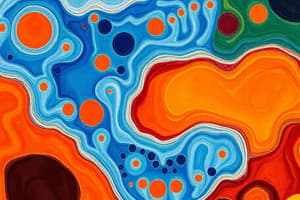Podcast
Questions and Answers
What is the main characteristic of permanent tissue?
What is the main characteristic of permanent tissue?
- Only found in animals
- Has specific roles and does not undergo cell division (correct)
- Exists independently of other cells
- Undergoes cell division continuously
Which of the following is a function of xylem in plants?
Which of the following is a function of xylem in plants?
- Providing mechanical support
- Producing carbohydrates through photosynthesis
- Transporting water and nutrients within the plant (correct)
- Transporting organic materials
In animals, which tissues fall under the category of permanent tissue?
In animals, which tissues fall under the category of permanent tissue?
- Nervous tissues
- Epithelial tissues
- Highly organized tissues like muscles and bones (correct)
- Meristematic tissues
What is the main function of phloem in plants?
What is the main function of phloem in plants?
Which type of tissue is responsible for continuous growth in plants?
Which type of tissue is responsible for continuous growth in plants?
What is the main characteristic of meristematic tissue in plants?
What is the main characteristic of meristematic tissue in plants?
Which of the following is NOT an example of animal tissues derived from the mesoderm?
Which of the following is NOT an example of animal tissues derived from the mesoderm?
In plants, which type of meristem is primarily responsible for the formation of secondary xylem and phloem?
In plants, which type of meristem is primarily responsible for the formation of secondary xylem and phloem?
Which type of tissue is composed of one homogenous type of cell performing a single function?
Which type of tissue is composed of one homogenous type of cell performing a single function?
What do permanent tissues in plants primarily consist of?
What do permanent tissues in plants primarily consist of?
Which type of tissue consists of more than one cell type working together in plants?
Which type of tissue consists of more than one cell type working together in plants?
Flashcards are hidden until you start studying
Study Notes
Tissue: A Foundation of Life's Complexity
Life is intricately structured down to its smallest components - cells. However, these individual units don't exist independently; they work together within specialized groupings called tissues. To understand how life functions in the diverse world of living organisms, let's delve into the various types of tissues found in both animals and plants.
Permanent Tissue
This refers to mature tissue with specific roles that do not undergo cell division once developed. In plants, permanent tissue includes:
- Xylem: Provides mechanical support and transports water and nutrients from the roots to other plant parts.
- Phloem: Transports organic materials (carbohydrates, amino acids) produced by photosynthesis to different parts of the plant.
In animals, highly organized tissues like muscles and bones also fall under the category of permanent tissue because their primary function does not change after development.
Animal Tissues
Animals have four basic types of tissues based on structure and function:
- Ectodermal derivatives: Skin, hair, nails, mucous membranes, and nervous system
- Endodermal derivatives: Lining of the digestive tract and respiratory tubules
- Mesodermal derivatives: Muscles, connective tissue, blood vessels, kidneys, and reproductive organs
- Neural crest derived tissues: Melanocytes, some skeletal structures like cartilage and bone, smooth muscle cells, part of the peripheral nervous system, and certain sensory organs in vertebrate embryos
Animal tissues exhibit flexibility and adaptability to perform complex tasks such as movement, perception, and survival.
Plant Tissues
Plant tissues consist of two main categories: meristematic and permanent tissues.
- Meristematic tissue: Undifferentiated cells capable of dividing throughout the lifecycle of the plant. They produce new tissues through growth processes such as apical dominance and lateral bud formation. There are three types of meristems: apical meristems (growth tip), intercalary meristems (axillary buds), and cambial meristems (formation of secondary xylem and phloem).
- Permanent tissue: Maturing cells that carry out specific functions essential for maintaining and growing a plant. We discussed this above.
Each type of meristematic and permanent tissue works collaboratively in carrying out major physiological activities and ensuring vital functions in plants.
Meristematic Tissue
These undifferentiated cells enable continued growth and repair in plants. Examples include:
- Apical meristems: Located at the tips of stems and root ends, responsible for primary plant elongation
- Intercalary meristems: located below leaves and nodes, primarily involved in axillary bud initiation
- Cambial meristems: Found in vascular bundles, responsible for producing secondary xylem and phloem
Types of Tissues
Tissues can be further divided into several classes depending upon the organization of their constituent cells and their functional properties:
- Simple tissues: Composed of one homogenous type of cell, performing a single function (e.g., epidermis, parenchyma, collenchyma)
- Complex tissues: Consisting of more than one cell type working together (e.g., dermis, cortex, vascular tissues)
Understanding the complexity of tissues gives insight into the remarkable diversity and functionality displayed by all forms of life.
Studying That Suits You
Use AI to generate personalized quizzes and flashcards to suit your learning preferences.




